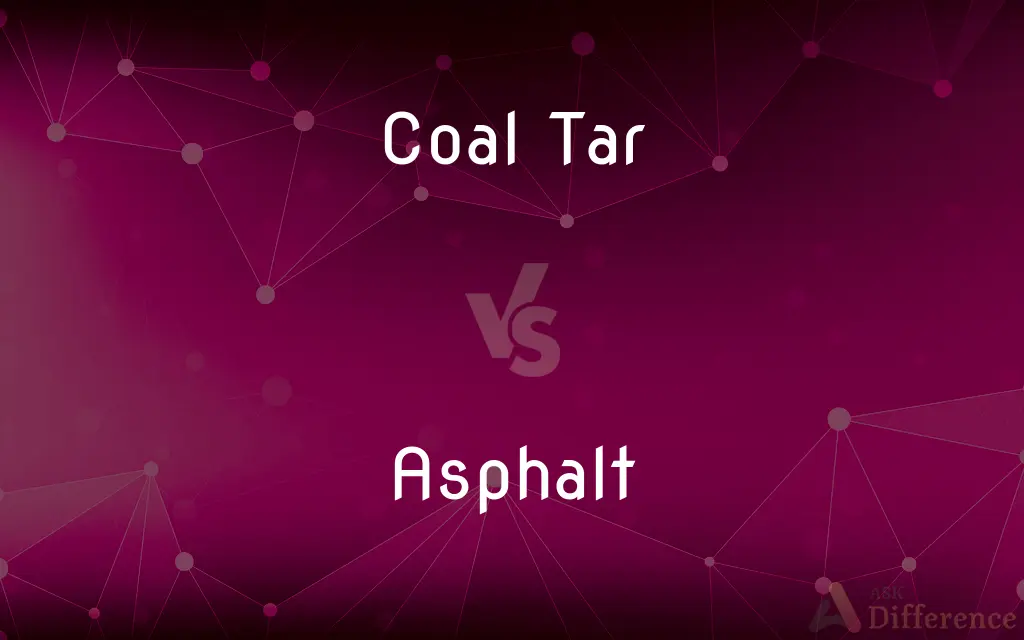Coal Tar vs. Asphalt — What's the Difference?
By Tayyaba Rehman — Published on October 30, 2023
Coal Tar is a durable liquid from coal processing, while Asphalt, a sticky bitumen, is primarily used for road surfaces.

Difference Between Coal Tar and Asphalt
Table of Contents
ADVERTISEMENT
Key Differences
Coal Tar and Asphalt, each utilized in surfacing and sealing applications, have unique origins and compositions. Coal Tar, a byproduct of coal carbonization, is known for its durable and resistant properties, often preferred in industrial coatings and sealants. Conversely, Asphalt, originating from crude oil, is widely celebrated in road construction, prized for its adhesive and waterproof qualities.
In the context of environmental impact and safety, Coal Tar and Asphalt present distinct profiles. Coal Tar is often scrutinized for containing polycyclic aromatic hydrocarbons (PAHs), potent substances that pose environmental and health concerns. Asphalt, comparatively, is considered environmentally friendlier and is more widely accepted in various applications due to its lower toxicity levels.
The application spectrum of Coal Tar and Asphalt each demonstrates their own set of advantageous characteristics. Coal Tar, with its remarkably resilient nature, offers a robust defense against elements like moisture and chemicals, hence finds prominence in protective coatings. Asphalt, owing to its excellent adhesion and cost-effectiveness, dominates the realm of road construction and roofing materials.
Durability and maintenance aspects offer another platform where Coal Tar and Asphalt can be contrastively evaluated. Coal Tar, recognized for its stalwart resistance to wear and tear and enhanced durability, demands less frequent maintenance interventions. In contrast, while Asphalt does provide durable solutions, it may require more regular upkeep to manage potential wear and surface degradation.
Considering aesthetic and practical application, Coal Tar and Asphalt cater to different consumer preferences and industry needs. Coal Tar often imparts a glossy finish upon application, favored in certain aesthetics-driven projects. Asphalt, offering a matte finish and unparalleled workability, takes precedence in expansive projects like highway construction, where visual shine is not a priority.
ADVERTISEMENT
Comparison Chart
Origin
Derived from coal carbonization
Sourced from crude oil
Environmental Impact
Higher due to PAHs
Lower and widely accepted
Primary Use
Industrial coatings and sealants
Road construction and roofing materials
Durability & Maintenance
Durable with less frequent maintenance
Durable but may require regular upkeep
Finish
Often glossy
Typically matte
Compare with Definitions
Coal Tar
A byproduct of coal carbonization used in coatings.
The workers applied coal tar to prevent steel corrosion.
Asphalt
A substance utilized for waterproofing purposes.
Asphalt shingles are popular due to their waterproof properties.
Coal Tar
A chemical reservoir used in producing various products.
The coal tar was processed to create synthetic dyes.
Asphalt
A black semi-solid hydrocarbon used in paving roads.
The crew laid asphalt to create a smooth driving surface.
Coal Tar
A dark, viscous material for waterproofing.
They utilized coal tar to waterproof the wooden boats.
Asphalt
A binder mixed with aggregate particles to pave surfaces.
Asphalt concrete is a choice material for highway construction.
Coal Tar
A substance utilized in medical treatments, especially psoriasis.
The doctor prescribed a coal tar shampoo for the scalp condition.
Asphalt
See bitumen.
Coal Tar
A protective sealant against environmental elements.
The bridge was coated with coal tar to prevent damage from saltwater.
Asphalt
A mixture of bitumen with crushed stone gravel or sand, used for paving or roofing.
Coal Tar
Alternative spelling of coal tar
Asphalt
To pave or coat with asphalt.
Asphalt
A sticky, black and highly viscous liquid or semi-solid, composed almost entirely of bitumen, that is present in most crude petroleums and in some natural deposits.
Asphalt
Ellipsis of asphalt concrete, a hard ground covering used for roads and walkways.
Asphalt
(transitive) To pave with asphalt.
Asphalt
Mineral pitch, Jews' pitch, or compact native bitumen. It is brittle, of a black or brown color and high luster on a surface of fracture; it melts and burns when heated, leaving no residue. It occurs on the surface and shores of the Dead Sea, which is therefore called Asphaltites, or the Asphaltic Lake. It is found also in many parts of Asia, Europe, and America. See Bitumen.
Asphalt
A composition of bitumen, pitch, lime, and gravel, used for forming pavements, and as a water-proof cement for bridges, roofs, etc.; asphaltic cement. Artificial asphalt is prepared from coal tar, lime, sand, etc.
Asphalt
To cover with asphalt; as, to asphalt a roof; asphalted streets.
Asphalt
Mixed asphalt and crushed gravel or sand; used especially for paving but also for roofing
Asphalt
A dark bituminous substance found in natural beds and as residue from petroleum distillation; consists mainly of hydrocarbons
Asphalt
Cover with tar or asphalt;
Asphalt the driveway
Asphalt
A material commonly used in flat roofing solutions.
The building utilizes asphalt roofing for durability and protection.
Asphalt
A medium for creating blacktop surfaces.
The playground was surfaced with fresh asphalt for the children.
Common Curiosities
What kind of finish does Coal Tar provide?
Coal Tar often provides a glossy finish and is durable against various elements.
Can Asphalt be used for waterproofing?
Yes, Asphalt is used in waterproofing applications, especially in roofing.
What is Coal Tar mainly used for?
Coal Tar is often utilized in industrial coatings, sealants, and some medical treatments.
Can Coal Tar be used in boat construction?
Yes, Coal Tar is utilized to waterproof and protect wooden boats.
Does Coal Tar contain harmful chemicals?
Coal Tar does contain PAHs, which can pose environmental and health risks.
Can Coal Tar be used in medical treatments?
Yes, Coal Tar is used in treating conditions like psoriasis and dandruff.
What is the aesthetic outcome of using Asphalt?
Asphalt typically imparts a matte finish to the surfaces it is applied to.
Is Asphalt predominantly used in road construction?
Yes, Asphalt is widely used for paving roads due to its adhesiveness and durability.
Which material is commonly used in roofing?
Asphalt is commonly used in roofing due to its waterproofing capabilities.
Is Coal Tar durable in harsh environmental conditions?
Yes, Coal Tar is renowned for its durable and resistant properties in various conditions.
Which material, Coal Tar or Asphalt, requires more maintenance?
Asphalt might require more frequent maintenance compared to Coal Tar.
Is Asphalt considered environmentally friendly?
Asphalt is generally considered more environmentally friendly than Coal Tar.
Is Coal Tar used in creating synthetic dyes?
Yes, Coal Tar can be processed to produce various synthetic dyes.
Does Coal Tar resist chemical damage?
Coal Tar is notably resistant to chemical damage and corrosive elements.
Are there different types of Asphalt?
Yes, there are various types of Asphalt used in different construction contexts.
Share Your Discovery

Previous Comparison
IMAX vs. INOX
Next Comparison
Animately vs. AnimatedlyAuthor Spotlight
Written by
Tayyaba RehmanTayyaba Rehman is a distinguished writer, currently serving as a primary contributor to askdifference.com. As a researcher in semantics and etymology, Tayyaba's passion for the complexity of languages and their distinctions has found a perfect home on the platform. Tayyaba delves into the intricacies of language, distinguishing between commonly confused words and phrases, thereby providing clarity for readers worldwide.













































